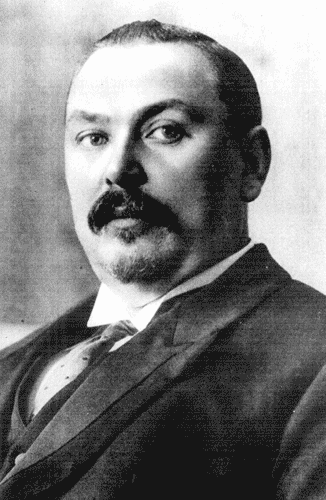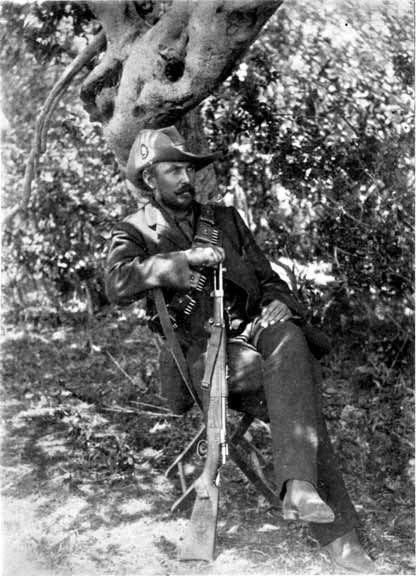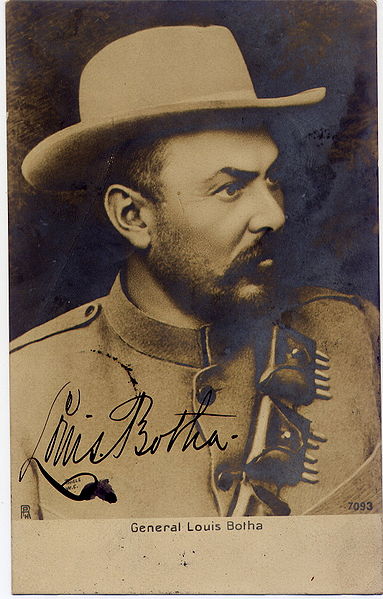<Back to Index>
- Psychologist Albert Ellis, 1913
- Painter Frank Handlen, 1916
- 1st Prime Minister of South Africa Louis Botha, 1862
PAGE SPONSOR



Louis Botha (27 September 1862 – 27 August 1919) was an Afrikaner and first Prime Minister of the Union of South Africa — the forerunner of the modern South African state. A Boer war hero during the Second Boer War he would eventually fight to have South Africa join Britain as a member of the Dominion.
He was born in Greytown (now in KwaZulu-Natal) as one of 13 children born to Louis Botha Senior (26 March 1827 - 5 July 1883) and Salomina Adriana van Rooyen (31 March 1829 - 9 January 1886).
He became a member of the parliament of Transvaal in 1897, representing the district of Vryheid. Two years later Botha fought in the Second Boer War, initially under Lucas Meyer in Northern Natal, and later as a general commanding and fighting with impressive capability at Colenso and Spioen kop. On the death of P.J. Joubert, he was made commander-in-chief of the Transvaal Boers, where he demonstrated his abilities again at Belfast - Dalmanutha. Winston Churchill revealed that General Botha was the man who captured him at the ambush of a British armoured train on 15 November 1899. Churchill was not aware of the man's identity until 1902, when Botha traveled to London seeking loans to assist his country's reconstruction, and the two met at a private luncheon. The incident is also mentioned in Arthur Conan Doyle's book, The Great Boer War, published in 1902.
After the fall of Pretoria in March 1900, Botha led a concentrated guerrilla campaign against the British together with Koos de la Rey and Christiaan de Wet. The success of his measures was seen in the steady resistance offered by the Boers to the very close of the three year war. Botha was a representative of his countrymen in the peace negotiations of 1902, and was signatory to the Treaty of Vereeniging. After the grant of self - government to the Transvaal in 1907, General Botha was called upon by Lord Selborne to form a government, and in the spring of the same year he took part in the conference of colonial premiers held in London. During his visit to England on this occasion General Botha declared the whole - hearted adhesion of the Transvaal to the British Empire,
and his intention to work for the welfare of the country regardless of
(inter - white) racial differences (in this era referring to
Boers / Afrikaners as a separate race to British South Africans). He
later worked towards peace with the British, representing the Boers at
the peace negotiations in 1902. In the period of reconstruction under
British rule, Botha went to Europe with de Wet and de la Rey to raise
funds to enable the Boers to resume their former avocations. Botha,
who was still looked upon as the leader of the Boer people, took a
prominent part in politics, advocating always measures which he
considered as tending to the maintenance of peace and good order and
the re-establishment of prosperity in the Transvaal. His war record
made him prominent in the politics of Transvaal and he was a major
player in the postwar reconstruction of that country, becoming Prime
Minister of Transvaal on 4 March 1907. In 1911, together with another
Boer war hero, Jan Smuts, he formed the South African Party, or SAP. Widely viewed as too conciliatory with Britain, Botha faced revolts from within his own party and opposition from James Barry Munnik Hertzog's National Party. When South Africa obtained dominion status in 1910, Botha became the first Prime Minister of the Union of South Africa. After the First World War started, he sent troops to take German South West Africa, a move unpopular among Boers, which provoked the Boer Revolt. At the end of the War he briefly led a British Empire military mission to Poland during the Polish - Soviet War. He argued that the terms of the Versailles Treaty were too harsh on the Central Powers,
but signed the treaty. Botha was unwell for most of 1919. He was
plagued by fatigue and ill - health that arose from his robust waist - line. That
he was fat is certain as related in the marvellous account of Lady
Mildred Buxton asking General Van Deventer if he was bigger than Botha,
to which Van Deventer replied: “I am longer, he is thicker.” (In Afrikaans thicker literally means fatter.) General Louis Botha died of heart failure on
27 August 1919 in the early hours of the morning. His wife Annie was at
home and was joined by Engelenburg who had acted as a private secretary
to Botha. Botha was laid to rest in Heroes Acre Pretoria. Of Botha, Winston Churchill wrote in Great Contemporaries,
"The three most famous generals I have known in my life won no great
battles over a foreign foe. Yet their names, which all begin with a
'B", are household words. They are General Booth, General Botha and General Baden-Powell..." Sculptor Raffaello Romanelli created the equestrian statue of Botha that stands outside Parliament in Cape Town in South Africa.